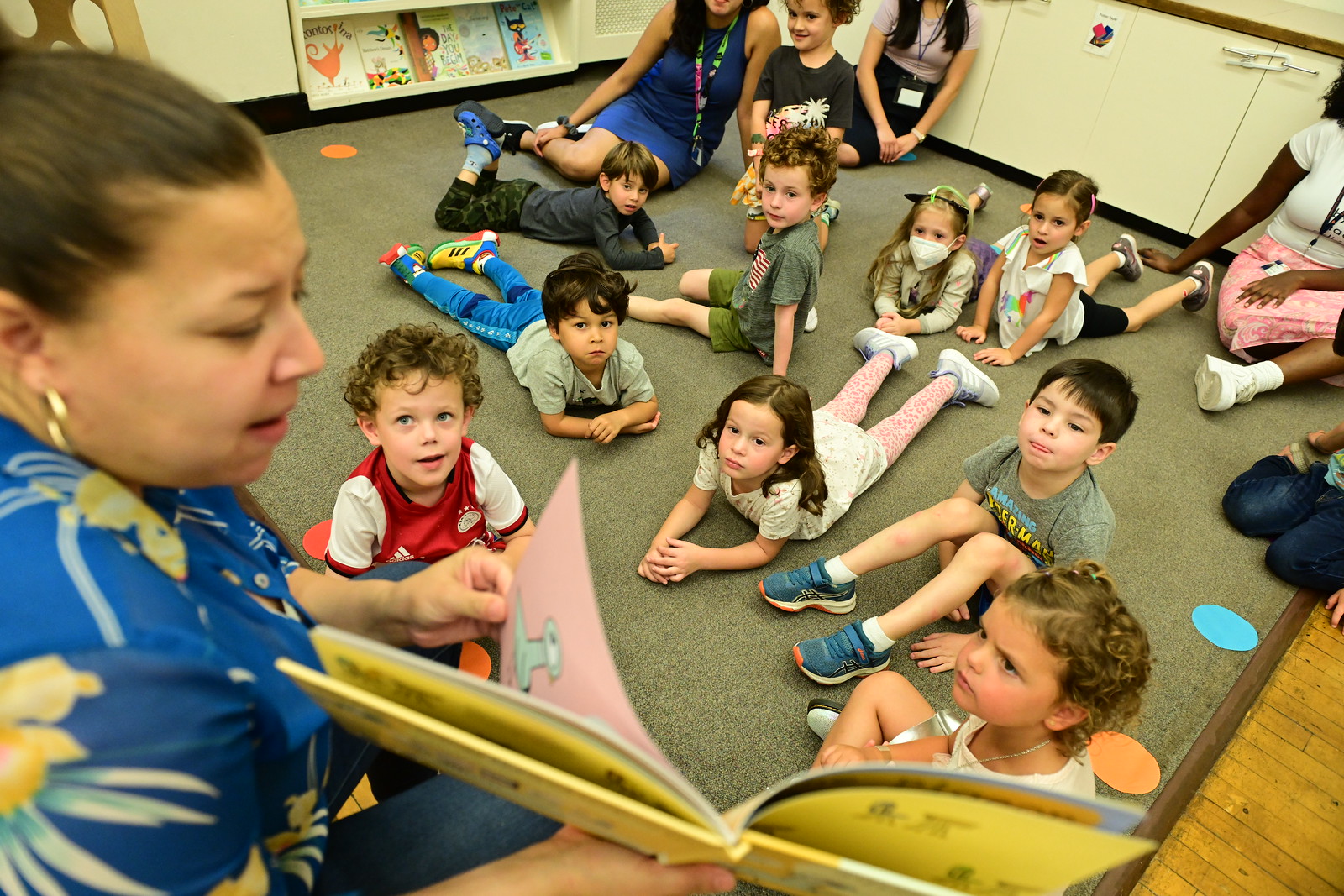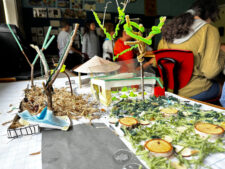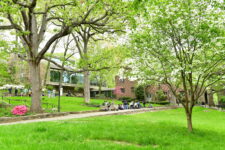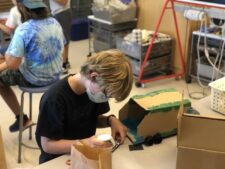At the heart of engagement with any academic subject are curiosity and joy. Fostering a love of reading and writing requires a lot of focus, patience, and joy-centered practice. The literacy programs within both of the Ethical Culture Fieldston School’s lower divisions — Ethical Culture and Fieldston Lower — are experiential, are flexible to student needs, and share a common goal: to ensure our students walk through the doors at Fieldston Middle on their first day of 6th Grade feeling prepared, confident, and excited to learn. Here is an overview of the ECFS approach to literacy.

The big picture
Especially in recent years, there has been an all-hands-on-deck approach to learning and, more specifically, to literacy in the wake of the COVID-19 pandemic — a moment in educational history when literacy scores have sharply declined across the country.
“At the height of the COVID-19 pandemic, we increased the amount of time dedicated to language arts and math learning. We felt these shifts were necessary to ensure our students were still progressing despite the many challenges they faced. The teachers, in turn, used their creativity and student-centered approach to keep this increase in academic time both fun and engaging,” explains Fieldston Lower Principal Joe McCauley.
Our elementary-level divisions have dedicated literacy specialists who work with our students in many capacities each week. Whether it be a visit to a classroom to support classroom teachers, in a small group session, or even in a one-on-one setting, the learning specialists work diligently to meet our students where they are in their reading, writing, comprehension, and fluency journies.
“At Ethical Culture, we strive to ensure that students are given differentiated instruction that will allow them to move seamlessly from learning to read to reading to learn,” explains Assistant Principal for Academic Life at Ethical Culture Melinda Velez.
Teaching literacy to students in Pre-K–2nd Grade
When our youngest students enter Pre-K and Kindergarten, teachers and learning specialists encourage the curiosity and joy they have already garnered through being read to at home.
“From the first month of their schooling experience, our youngest learners are encouraged to express themselves in pictures, spoken words, and writing, if they are ready,” explains Assistant Principal for Academic Life at Fieldston Lower Shawn Chisty. “Our teachers actively help each child sequence their thoughts to place content, words, thoughts, and actions in order. They lay the foundations of pre-literacy skills that build focused attention to thoughts, working memory, sequencing, and much more. Learning feels boundless when students are equipped with appropriate literacy skills at each grade level.”

Once students reach 1st Grade, much of September and October is spent assessing student reading and writing levels and thoughtfully constructing small groups based on each student’s individualized needs. The programming that follows these assessments is designed to be flexible and fluid. For example, a student may enter the academic year with strong spelling and fluency skills but may require additional support with comprehension. This student may begin the year working one-on-one with a learning specialist and, after specialized instruction in comprehension, will move back to the classroom to engage in small-group reading using grade-level texts. These small groups are routinely reassessed and adjusted to ensure students feel simultaneously supported and challenged and to encourage collaboration with their peers.
By 2nd Grade, Fieldston Lower Learning Specialist Jen Garnett’s and Ethical Culture Learning Specialist Zana Milovanovich’s classes are plugged into Fundations — a multisensory, structured language program providing a road map for their literacy journeys. Using the Fundations programming, teachers cover phonemic awareness, vocabulary, comprehension strategies, spelling, handwriting, and many more skills essential to literacy.
In Garnett’s classroom, shelves overflowing with books of all shapes and sizes line the classroom walls, and you’d be hard-pressed to find a space in the room not covered with colorful letters of the English alphabet. Calming music plays over the speaker as three eager 2nd Graders are invited into the room for their small-group language arts lesson. They grab their student and composition notebooks, which are neatly organized on a shelf, and begin the lesson by writing three sentences about their weekend.
“Not only do we teach our students the critical elements that allow them to read and write, but we incorporate social-emotional learning (SEL) into everything we do,” explains Garnett. “Our students collaborate to share stories and ideas, express emotions in their writing, and even learn the skills needed to teach one another. It’s all very student-centered.”

Teaching literacy to students in 3rd–5th Grades
As students get older, they use the building blocks and foundational skills they learned in earlier grades to expand their engagement with literacy even further.
In 3rd Grade, teachers adopt a guided reading approach to teach and practice strategies for reading comprehension with literature across genres and diverse perspectives. Students work through the steps of the writing process, including drafting, revising, and editing, and learn to express themselves clearly and competently using varied sentence structures. 4th Graders develop and expand their comprehension, vocabulary, and critical thinking by reading texts across genres and perspectives. By this point, students are expected to use capitalization, punctuation, and grammar accurately and write their first expository essay based on their social studies research.
In a 5th Grade classroom at Ethical Culture, Learning Specialist Karen Rose was guiding students in writing a longer-form nonfiction piece on a chosen subject. By this point, students can analyze and make connections between texts, themselves, and the world around them. While students diligently worked, Rose provided individualized instruction and support that encouraged them to seek help when needed, think critically, and express their creativity in writing.

“Teachers in later grades build on this foundation by teaching more commonly known literacy skills — forming words, understanding sentence structure, crafting powerful paragraphs, and more. Each student simultaneously has numerous opportunities to apply these skills to projects, discussions, debates, design thinking tasks, and other capstone experiences in our core curriculum. Our program is designed to show our students that working hard at reading and writing sets them up to be empowered learners for life,” explains Chisty.
Upon entering a classroom on either of our lower school campuses, one thing is especially clear: teachers, learning specialists, librarians, and administrators treat every moment spent with our students as an opportunity to teach them something new. Whether our youngest students are learning how to draw a lowercase “j” by starting at the grass line, learning to write a suspenseful paragraph, engaging in a thoughtful conversation about a particularly difficult passage, or even laughing along while their teacher reads a silly story, one thing is undeniable: literacy sparks joy.



